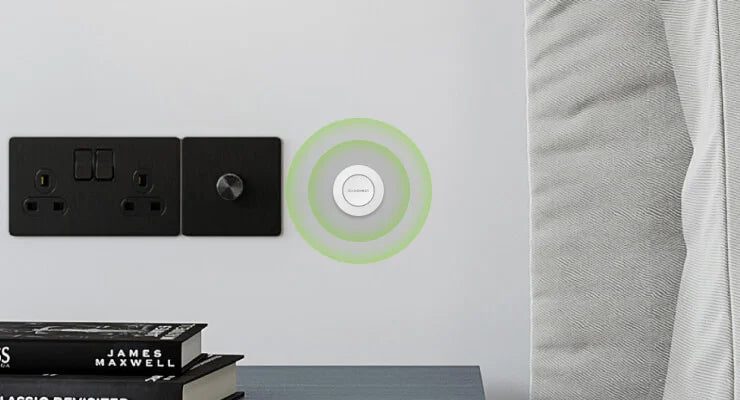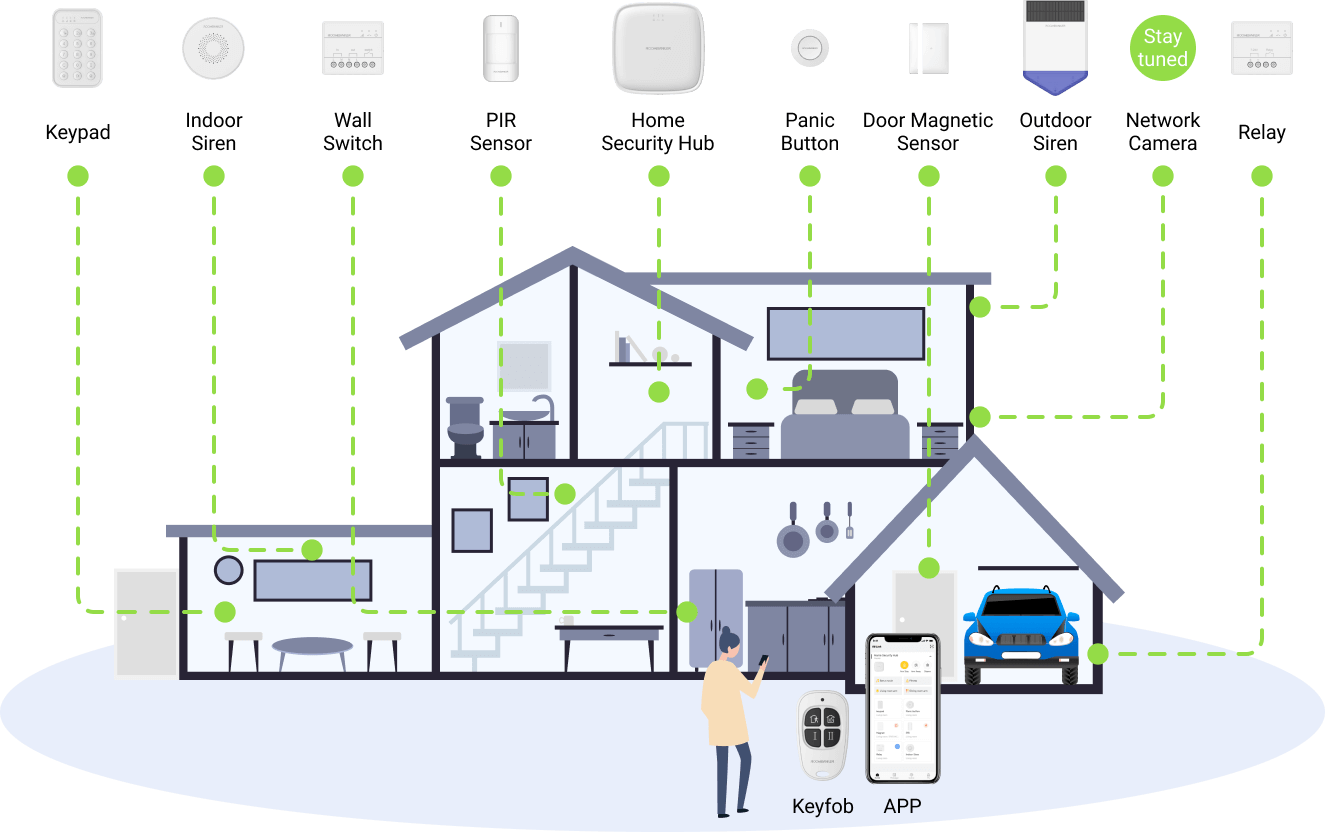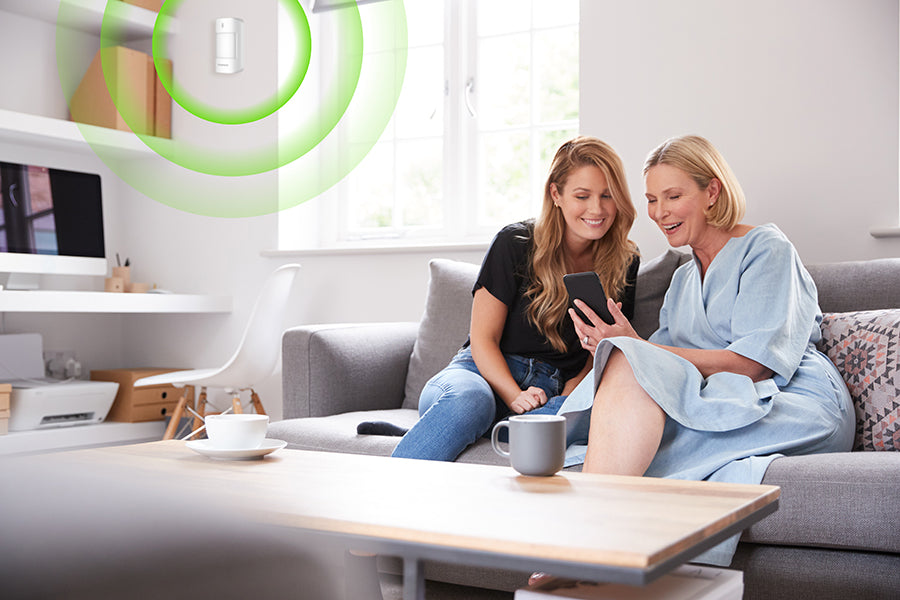The Five Best Panic Buttons in 2024
Here is our top picks for the best panic buttons in 2024:
| Roombanker Panic Buttons | Mobile 2.0 by Medical Guardian | SimpliSafe Panic Button | ROAR panic button | |
| Best For | Best to Try in 2024 | Best on the go | Best Discreet | Best wearable |
| Type | Wireless | Wireless | Wireless | Wireless |
| Wireless technology | RBF wireless technology ( A cuttng-edge new technology features ultra-long distance, low power consumption and high security. It delivers better performance than BLE, Zigbee and LoRa protocol | 4G LTE, WiFi, Bluetooth, and GPS | Bluetooth, WiFi, and 4G LTE | Bluetooth, WiFi, and 4G LTE |
| Monthly monitoring price | Self-monitored system with no subscription fees charged | $39.95 | $29.99 | Pricing Available By Request (ROAR has opted not to share general pricing on their profile ) |
| Battery lifespan | 3 years | Up to 5 days | 5-10 years | up to 5 years |
| App compatibility | YES | YES | YES | YES |
Roombanker Panic Buttons: The Best Option for Optimal Security in 2024
Roombanker panic alarm button is designed with convenience and functionality in mind. They are simple to handle and operate thanks to the ergonomic, lightweight, and small design. These button offers a flexible option to suit your demands, regardless of your preference for holding the panic button in your palm or mounting it on the wall for convenient access.
Moreover, these panic buttons guarantee a thorough and effective reaction in the event of an emergency because they are integrated with the home security alarm systems, in order to ensure a comprehensive and efficient response in case of emergencies.
The exceptional wireless performance is one of the most notable features of Roombanker Panic Buttons. By using RBF Technology, which features ultra-long range reaching up to 1500 meters, it makes them ideal for protecting expansive areas like residences, workplaces, or commercial buildings. The RBF is also very secure and stable because it minimizes the possibility of interference and guarantees reliable communication with the home security hub.
The low-power protocol was used in the design of the panic buttons to reduce power consumption. Furthermore, a three-year battery life is equipped so it is able to offer constant security without requiring regular battery changes or recharging.
In addition to their impressive features, Roombanker Panic Buttons are alsoreasonably priced. There is also a user-friendly app that complements the function of panic buttons. The best part is that there are no monthly costs, which makes it an economical option for people looking for an affordable and reliable security alarm system.
All things considered, Roombanker Panic Buttons are the best option to try in safeguarding your property in 2024.
Features:
- Long range RBF wireless technology.
- Long-lasting battery of up to three years.
- It can be handheld or mounted in the wall or under a desk.
- It is a component of Roombanker’s home security system.
- Self-monitored, which means no subscription fees at present.
Mobile 2.0 by Medical Guardian: Best Pendant Style Panic Button
 Mobile 2.0 provides an intuitive design with a voice-activation function. This makes it user-friendly and easy to use for all ages.
Mobile 2.0 provides an intuitive design with a voice-activation function. This makes it user-friendly and easy to use for all ages.
Designed to accommodate daily routines, this panic button is water-resistant for use even in the shower. It also includes LED indicators for clear status updates.
Moreover, this panic button ensures continuous protection with advanced location monitors through GPS, WiFi, and 4G LTE, even while charging.
Features:
- Lightweight design
- Sync Distance: Up to 500 ft
- Long-lasting (up to 3-5 day)
- Water-resistant design
- Advanced hourly location monitoring via GPS, WiFi, and LTE
- Water-resistant and shower-proof design
- Access to MyGuardian (caregiver connection tool)
- Smarti Voice Assist
- Charging Time: 4 hours for full charge
SimpliSafe Panic Button: Best Discreet Panic Button

The SimpliSafe Panic Button offers a simple yet effective solution for personal safety and security.
With its sleek design and easy-to-use functionality, this device provides peace of mind at your fingertips. Whether you’re in need of immediate assistance or simply want to alert loved ones in case of an emergency, the SimpliSafe Panic Button is a reliable tool.
Its wireless connectivity ensures that help is just a press away, without the hassle of complicated setups or wiring. The button’s discreet size allows for convenient placement in various locations, whether it’s on your keychain, in your pocket, or mounted on a wall.
Additionally, its compatibility with SimpliSafe’s home security systems enhances its effectiveness, seamlessly integrating into your existing setup.
Features:
- Wireless
- 5-10 year battery life
- 1 Lithium 2032 3v battery (required)
- Can be customized to send audible or silent alarms
- 1.5 x 2.25 x 0.62 inches
- Set up medical alerts
ROAR Panic Button

The ROAR panic button offers a discreet and reliable safety solution. Its compact design ensures easy concealment, making it ideal for discreet emergency situations.
The button’s one-touch activation swiftly alerts pre-set contacts and emergency services, streamlining response times. It also has an intuitive interface to ensure effortless operation, even in moments of distress.
Additionally, the device’s robust build guarantees durability for prolonged use. However, its effectiveness may depend on cellular network coverage, limiting functionality in remote areas.
Things to Consider When Choosing the Right Panic Buttons
Here are essential factors to consider when choosing the right panic button for your needs:
- Type of emergency: You need to determine the kind of emergency you anticipate. For medical emergencies, choose a panic button with in-built medical alert features. Similarly, for personal safety threats, choose a panic button with duress alarm.
- Mobility and location: You need to assess where your panic button will be used. Wearable or wall-mounted panic buttons are perfect for homebound individuals or those with limited mobility. Similarly, for individuals that need assistance outside their home, choose mobile panic buttons with GPS capabilities.
- Ease of use: It is essential to choose an intuitive panic button that will be easy to operate, even in stressful situations. Consider things like activation method, placement, and button size to ensure quick and effortless use.
- Customization options: You should look for panic buttons that provide options based on your personal needs. This may include setting up automated alerts, specifying the type of assistance required, or programming emergency contacts for specific situations.
- Cost and affordability: Balance the capabilities and features of the panic button with your budget. You should compare pricing plans, upfront costs, and any ongoing fees associated with monitoring equipment or services.
- Integration with existing systems: If you have existing home automation or security systems, you should ensure integration and compatibility with the panic button to streamline operations and enhance overall security.
- Battery life: You need to consider the battery life span of the panic button. Opt for panic buttons with long-lasting batteries or rechargeable options to minimize downtimes.
Tips To Using Panic Button Correctly
Understanding the functionality of a panic button and implementing proper usage can make a significant difference in emergency situations.
Here are some tips to use a panic button effectively:
- Familiarize yourself: Take the time to understand how your panic button works. Whether it’s a standalone device or integrated into a smartphone app, read the user manual thoroughly and familiarize yourself with its features.
- Accessible placement: Ensure that your panic button is within reach at all times, whether it is on your keychain, as a wearable device, or an app icon on your phone’s home screen.
- Preprogrammed contacts: If your panic button allows for preprogramming contacts, set it up with the relevant emergency contacts such as family members, friends, or local authorities. Make sure these contacts are updated regularly.
- Test regularly: Periodically test your panic button to ensure that it is functioning correctly. This practice can help identify any issues or malfunctions before an actual emergency occurs. We also recommend testing it first when you buy a panic button, instead of using it directly when you meet an emergency.
- Stay calm: In an emergency situation, press the panic button firmly but avoid panicking yourself. Remaining calm and composed, with clear thinking can help convey your situation more effectively to responders.
- Practice situational awareness: Be aware of your surroundings and assess the situation before activating the panic button. Ensure that you are in a safe location where you can communicate effectively with responders without putting yourself at further risk.
- Inform others: Let trusted individuals know that you have a panic button and how to use it. This can include family members, close friends, or coworkers who may need to assist you in an emergency.
- Stay updated: Keep your panic button app or device updated with the latest software and firmware to ensure optimal performance and compatibility with your device.
- Follow up: After using the panic button, follow up with emergency services or contacts to ensure that help is on the way and provide any additional information if needed.
Applications of Panic Buttons
Panic buttons serve as a vital tool in various settings to enhance safety and security measures. Here is how they are applied in different areas:
Personal safety and security
- Home security: Panic buttons are commonly integrated into home security systems. In case of an emergency such as a break-in or medical issue, individuals can quickly summon help by pressing the panic button.
- Personal wearables: Wearable panic buttons, often in the form of necklaces or bracelets, are available for personal use. These devices are particularly useful for elderly individuals or those with medical conditions who may require immediate assistance.
- Mobile applications: Many smartphone applications offer panic button features that allow users to send distress signals to pre-defined contacts or emergency services with just a few taps on their phones.
Public safety
- Public transportation: Panic buttons are installed in public transportation vehicles such as buses and trains to enable passengers to alert authorities in case of accidents, assaults, or other emergencies.
- Public buildings: Panic buttons can be strategically placed in public buildings like schools, hospitals, and government offices to provide a quick and discreet way for individuals to call for help during threatening situations like active shooter incidents or medical emergencies.
- Street safety: In some urban areas, panic buttons are installed at street corners or in public spaces to allow people to report crimes or summon assistance in unsafe situations.
Workplace safety
- Emergency response: In workplaces, panic buttons are often part of comprehensive safety protocols. They can be installed at reception desks, in employee break rooms, or on individual workstations to enable employees to quickly alert security personnel or emergency services in case of workplace violence, accidents, or medical emergencies.
- High-risk environments: Industries such as healthcare, retail, and banking, where employees may face heightened risks of robbery or assault, commonly use panic buttons as part of their security measures.
- Remote work: With the rise of remote work, virtual panic buttons integrated into company communication platforms or applications provide employees working from home with a means to quickly report security threats or emergencies to their employers or authorities.
Final Thought
In conclusion, choosing the best panic button depends on individual needs and preferences. Whether for personal safety, home security, or workplace protection, you may want to evaluate features such as ease of use, reliability, and integration with existing systems.
We hope this article has been valuable and informative in expanding your knowledge of the best panic buttons in 2024. If you find it challenging to choose the best panic button, do not hesitate to contact us. Our team of experienced experts will provide further guidance and assist you with any inquiry.
FAQs of Panic Buttons
Who should use a Panic Button?
Ultimately, anyone who values their safety and wants a quick and reliable way to call for help in an emergency can benefit from using a Panic Button. Here are some individuals and situations that will find a panic button useful:
Elderly individuals living alone: They can use panic buttons to quickly summon help in case of falls or medical emergencies.
Individuals with disabilities: Especially those who may have difficulty reaching a phone or communicating in an emergency, can use Panic Buttons to call for assistance.
Women living alone or in unsafe areas: These individuals may feel safer knowing they have a quick way to alert authorities or loved ones in case of an emergency.
Retail workers: Employees in retail shops, especially those working late shifts or in isolated areas of the store, can use Panic Buttons to discreetly notify security or management if they encounter a threatening situation such as theft or harassment.
Healthcare workers: Healthcare professionals working in hospitals or clinics can use Panic Buttons to call for help in case of patient aggression or other emergencies.
Schools and universities: Teachers, administrators, and students can use Panic Buttons to alert authorities in the event of a school shooting, medical emergency, or other crisis situation.
Homeowners and renters: These individuals can benefit from having a Panic Button integrated into their home security system, providing a quick way to call for help in case of a break-in or other emergency.
When should you use your Panic Button?
You should use your Panic Button in situations where immediate assistance is required due to threats to personal safety, medical emergencies, or instances of aggression or violence. It is crucial for situations where calling emergency services directly might not be possible or safe. Examples include home invasions, medical crises, or instances of harassment or assault.
Where should you keep the panic buttons that activate your Panic Alarm?
Keep Panic Buttons in easily accessible locations, such as near exits, by bedside tables, or on keychains. In homes, consider placing them discreetly but readily available in multiple rooms. For workplaces, ensure they’re within reach of employees at all times, especially in high-risk areas like cash registers or isolated sections. The goal is quick access in emergencies without drawing attention from potential threats.







Leave a comment
All comments are moderated before being published.
This site is protected by hCaptcha and the hCaptcha Privacy Policy and Terms of Service apply.